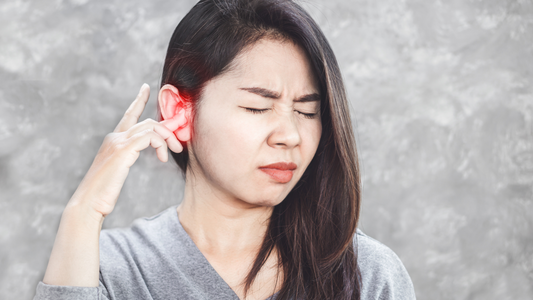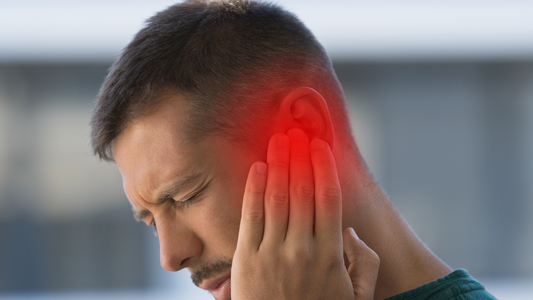Ever left a raucous football game with your ears buzzing? Wondering if that ringing after a weekend of yard work with the leaf blower is just part of getting older? You're not alone. Many folks shrug off these sounds, thinking they're just temporary or a sign of aging that can't be helped. But what if there's more to it? What if that ringing is a sign of tinnitus or hearing damage?
Let's cut to the chase—no one wants their golden years clouded by constant noise they can't silence. We're here to talk about that pesky problem no one seems to escape entirely: the link between noise and hearing trouble. You got it, we're zeroing in on tinnitus and hearing loss. And guess what? You can do something about it. Stick with us, and we'll chat about how to keep your ears sharp and those unwanted sounds at bay. Just imagine this as that heart-to-heart over the fence with your neighbor - no nonsense, just straight-up good advice.

How Does Noise Exposure Cause Tinnitus?
Feeling a ringing in your ears after a concert or a day at a loud worksite? That’s your ears telling you they're not happy. When your ears face off with loud sounds, the delicate inner workings take a hit. Inside your ear, there are tiny hair cells that dance to the vibrations of sound. Blast them with a noisy lawnmower, booming headphones, or a shrieking fire alarm, and these little guys can get bent out of shape - literally. If they’re damaged, they send false signals to your brain, and voila, you've got the buzzing or ringing of tinnitus as a constant companion.
Sure, our ears are champs at handling noise, but only up to a point. Think of them like elastic – stretch them too far, and they won’t bounce back. Chronic noise, like being stuck in heavy traffic every day or using power tools without ear protection, can leave you with a persistent case of tinnitus. Even a single, deafening blast at close range could slam your hearing with permanent consequences. The takeaway? Those ear muffs at the shooting range or earplugs at rock concerts aren’t just accessories, they're necessities.
Remember, tinnitus doesn't play favorites. It can sneak up on a teenager after blaring tunes or a grandparent post-machinery use. The good news? Being clued up means you can turn down the volume and safeguard those ears. Keep it real, keep it safe, and keep the peace (and quiet).
Can I Get Tinnitus From Short Term Noise Exposure?
Worried that one loud concert could leave you with a ringing in your ears? It's a valid concern. Just like a sudden burst of sunlight can dazzle your eyes temporarily, a blast of high-decibel sound can give your ears a jolt, triggering short-term tinnitus. This temporary form of tinnitus can buzz through your head after a night out with friends at a lively club or when you've had front-row seats to fireworks. But here's the thing – these fleeting episodes are often warning shots. They signal that it's time to protect your hearing before temporary nuisances become long-term residents in your auditory landscape.
Here are some quick tips to guard against noise-induced tinnitus, even when exposures are brief:
- Always have a pair of earplugs handy. If a situation is louder than you expected, pop them in.
- Respect your ears. Taking breaks during noisy events helps reduce their workload.
- Stay savvy about sound levels. Apps that measure noise can tell you when it's time to tone it down or gear up with protection.
Remember, your ears might be resilient, but they also rely on you to avoid the avoidable – so make ear protection a priority at every raucous rodeo!
Is Tinnitus From Noise Exposure Permanent?
So, is that buzzing ever going to buzz off for good? Here's the deal: if those ears of yours got blasted by a one-time loud noise, chances are the tinnitus might just pack its bags and hit the road after a while. But if you've been hitting your ears with a wall of sound day after day, that's when tinnitus might decide to move in permanently. Those inner ear hairs don't get a second chance, and when they're down for the count, tinnitus tends to stick around.
Let's break it down:
- Short-term exposure — tinnitus might be a temporary houseguest.
- Long-term exposure — tinnitus could be settling in for the long haul.
Keys to keeping tinnitus at bay? Lower the volume, folks! And if tinnitus gatecrashes your quiet moments, it's time for some ear TLC and a chat with your doc—pronto.
What Should I Do If I Think I Have Tinnitus?
Think those bells in your ears are signs of tinnitus? The first step is to stay calm and not jump to conclusions. Reach for the phone and set up an appointment with an audiologist or an ear, nose, and throat specialist. These pros can confirm whether what you're experiencing is tinnitus.
You'll likely go through a comprehensive hearing evaluation. This isn't just a "can you hear this?" kind of test. It assesses a variety of sounds and volumes to figure out the specifics of your hearing profile.
After sorting out the diagnosis, your specialist might chat with you about treatment options. We're talking about things like sound therapy, hearing aids, or certain medications. And hey, sometimes just understanding why your ears are ringing takes the edge off.
Let's lay out a couple more tips:
- Don't ignore the problem and hope it'll disappear – get those ears checked ASAP
- Maintain a healthy lifestyle – it can play a part in managing tinnitus symptoms
- Stay connected with others, because sharing your experiences can lead to valuable coping strategies
Living with tinnitus can be a challenge, but it doesn't have to take over your life. Knowing what steps to take can give you back a sense of control over the situation.
The Bottom Line
In the grand symphony of life, your hearing should be cherished like the rarest melody. Enduring loud noise may come with the territory of an active, engaged life, but the risk of lasting tinnitus underscores the need for vigilance. Recapping the essentials: prevention is your best ally, and prompt attention at the first whistle or hum of tinnitus can make all the difference.
Far from being an inevitable guest as you age, tinnitus is often preventable, and manageable when present. Take it from countless tales of concert-goers who wished they'd pocketed those earplugs, or the wisdom of generations before us advocating for moderation in all things—including noise levels.
And if tinnitus has already become part of your daily ensemble, stand firm—solutions abound. From technological wonders to simple lifestyle tweaks, there's a chorus of strategies to bring tranquility back to your auditory world.
Let the takeaway be this:
- Shield those ears before the clangs and bangs of life hit hard.
- Seek professional advice sooner rather than later at tinnitus' first encore.
- Explore the array of remedies that can restore harmony to your hearing.
Ultimately, let your journey through noise and silence be guided by awareness and action. Your hearing isn't just a sense—it's a resource that connects you to the people and passions that color your world.
Wrapping It Up with a Bow
Are those occasional ringing noises a reason to worry or just a passing nuisance? Remember, those quirky sounds you're hearing might be signalling it's high time to give your ears a little more love and protection.
Whether it's tinnitus or a bout of hearing trouble, there's plenty you can do to ease the annoyance and prevent future harm. Lower the boombox, buddy up with earplugs, and make some noise about preserving your hearing health. And hey, if things get a bit too quiet or the ringing won't quit, hearing aids like those from the HearWell Group are a smart move to bring clarity back to your world.
Bottom line: Don't just brush those sounds off. Make a little change today so you can keep tuning into life’s great soundtrack for years to come.
Sources & References
- Kujawa, S. G., & Liberman, M. C. (2009). Adding insult to injury: cochlear nerve degeneration after "temporary" noise-induced hearing loss. Journal of Neuroscience, 29(45), 14077-14085. https://www.ncbi.nlm.nih.gov/pmc/articles/PMC2812055/
- Maison, S. F., Bizup, B. T., Brutsaert, S., Thathiah, A., & Cunningham, C. (2023). Tinnitus with a normal audiogram: Relation to noise exposure but no evidence for cochlear synaptopathy. Scientific Reports, 13(1), 1-12. https://www.nature.com/articles/s41598-023-46741-5
- Stegeman, I., Velde, H. M., Robe, P. A., Stokroos, R. J., & Smit, A. L. (2019). Tinnitus treatment by vagus nerve stimulation: A systematic review. PloS One, 14(3), e0212282. https://www.ncbi.nlm.nih.gov/pmc/articles/PMC6402701/
- Wang, J., Puel, J. L., & Chabbert, C. (2022). Noise-induced cochlear synaptopathy and ribbon synapse repair: beyond hair cell regeneration. Neural Regeneration Research, 17(2), 264. https://www.ncbi.nlm.nih.gov/pmc/articles/PMC8712347/
- World Health Organization. (2021). World report on hearing. https://www.who.int/publications/i/item/world-report-on-hearing

The Hear Well Group Research Team: Trusted Hearing Health Insights
Our experienced research team compiles hearing health data from credible, peer-reviewed sources and presents it in easy-to-understand terminology. We ensure accuracy and trustworthiness, providing up-to-date, evidence-based recommendations to enhance hearing care practices and inform our readers' hearing well-being decisions.


